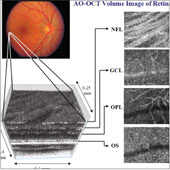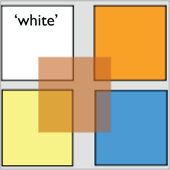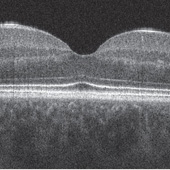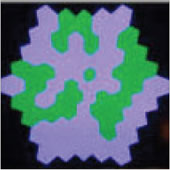Current Research
We are trying to understand the structural and functional basis of how we see, how and why our vision changes across the life span, and the factors that contribute to loss of vision associated with disease. We use several different approaches for our studies.
|
|
ElectrophysiologyThe electroretinogram (ERG) is a recording of the bioelectric potential, the summed activity of the retinal cells located at the back of the eye, when stimulated by light. When bioelectrical changes occur within the retina, the change is propagated to the surface of the cornea. |
 |
Retinal Imaging Click here for Introductory MovieWe have developed several different instruments for imaging the human retina at a cellular scale. One class of instrument uses adaptive optics to correct the temporally varying, higher-order aberrations of the eye. Another class of instrument uses interferometry to detect faint reflections from cells that would otherwise make them invisible in the living eye. These instruments have been used to study normal and diseased retinas and optic nerves. |
 |
Visual PsychophysicsThe color appearance of our environment generally remains relatively stable despite changes in context (e.g, due to illumination changes). This phenomenon is known as color constancy. Most research has tended to focus on short-term adaptation where recovery is fairly rapid. Our research focuses on changes in vision and perception across the life span. |
 |
Reading CenterThe UC Davis Eye Center hosts the Visual Field and OCT Reading Center to support clinical research. John L. Keltner and John S. Werner are the co-directors. The primary aim of the Reading Center is to ensure, through rigorous quality control, the validity and integrity of visual field and OCT data. |

